Last month, several local news platforms, including the Liberty Times (Chinese-language sister paper of the Taipei Times), reported that a newly-married Taiwanese man had used social media to ask how other people dispose of biandang (便當, bento) lunchboxes once they’ve eaten the contents.
During his bachelor existence, he admitted, he always threw empty bento boxes in with other non-recyclable solid trash. After his wedding, however, his wife instructed him to clean food containers thoroughly using dishwashing liquid, wait for them to dry out and then separate them for recycling.
Curious if this was a common practice, he posted a question in a Taiwan-centric Facebook group with 732,000 members.
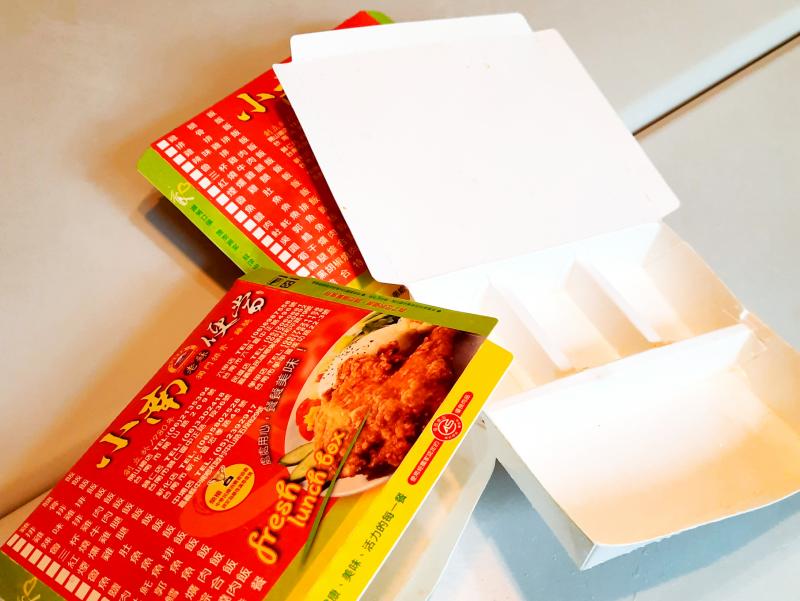
Photo: Steven Crook
The responses were numerous and varied. Some people agreed with the man’s wife. Her approach, according to Taiwan’s Environmental Protection Administration (EPA), is correct.
Other netizens insisted that lunchboxes (which are made of a special cardboard coated on one side with wax or a plastic film, so the box doesn’t absorb or leak liquids from the food) can’t be recycled. And around 80 percent of those who commented said they weren’t in the habit of removing food scraps and grease from meal containers so they could be properly processed.
At first glance, this dismal lack of consumer cooperation is hard to reconcile with statistics issued by the EPA’s Recycling Fund Management Board.
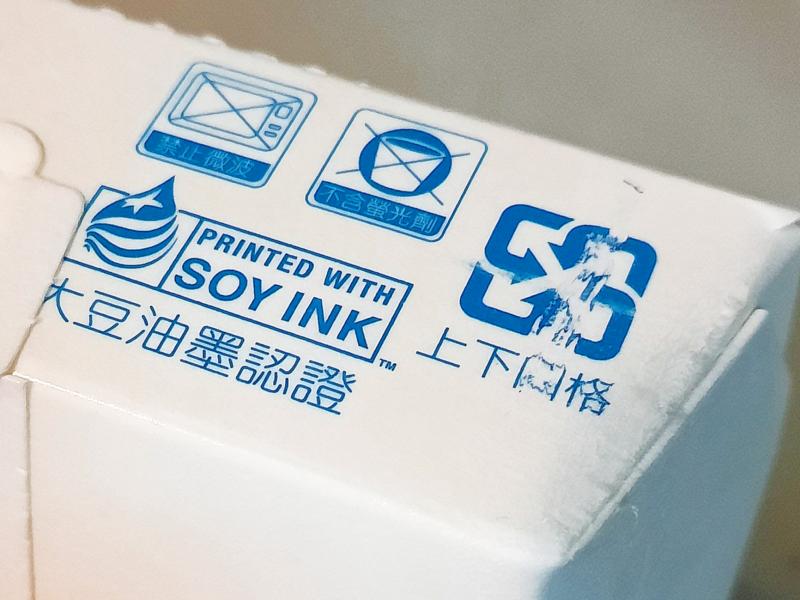
Photo: Steven Crook
PUBLIC AWARENESS
According to the board, which was established by the EPA in 1998 to draft regulations and pay out subsidies, efforts to bolster public awareness and improve waste-handling systems have had significant success. Official data show that, between 2017 and last year, the recycling rate for paper tableware such as bento boxes, bowls and coffee cups rose from 44 percent to over 85 percent. The total quantity recycled last year, 159,897 tonnes, was almost double that of 2019.
On May 13 this year, the Liberty Times reported that, to incentivize the recycling of tableware, the per kg subsidy for such material had been upped from NT$7.25 to NT$7.86, and payments to self-employed collectors of recyclables had also been increased.
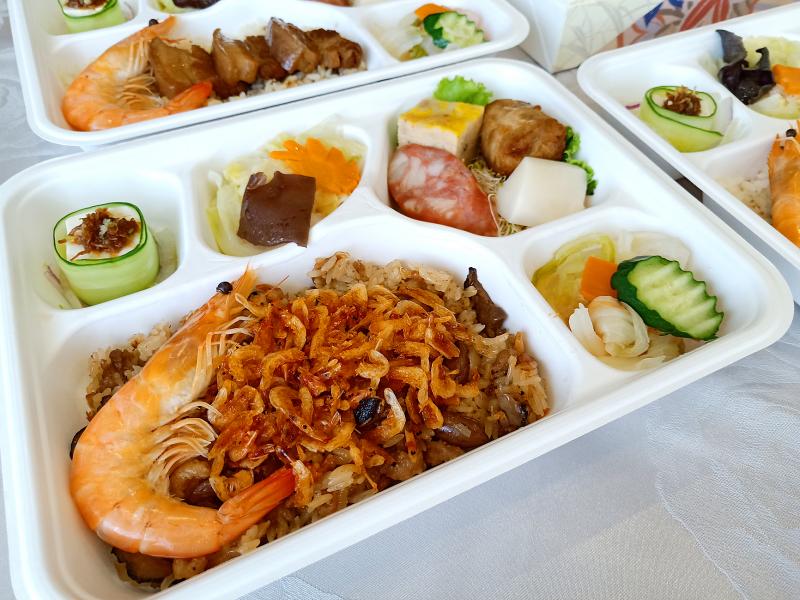
Photo: Wang Shu-hsiu, Taipei Times
As recently as late 2018, only one company in Taiwan had the ability to separate the cardboard component of bento boxes from the plastic film, turn the former into pulp (some of which becomes environmentally-friendly toilet paper) and the latter into polyethylene (PE) pellets for reuse. Since then, Miaoli-based Lien Tai Paper Corp has been joined by Cheng Loong Corp in Hsinchu County and Chung Hwa Pulp Corp in Taitung County, boosting the country’s annual recycling capacity for this kind of material to 249,600 tonnes.
A report in the Chinese-language United Daily News (UDN) — published on June 5, 2019, soon after Taiwan’s second tableware recycling facility had begun operations — asserted that whether or not tableware is separated, “more than 70 percent of it ends up in the incinerator, burned together with general garbage.”
However, the EPA is probably right when it describes (on an English-language page on its Web site) current recycling capacity as “ample.”
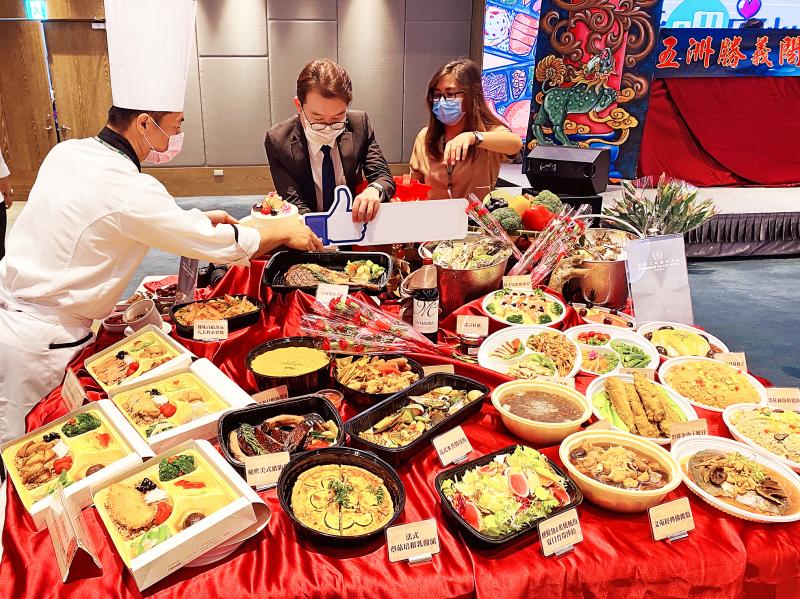
Photo: Tsai Tsung-hsun, Taipei Times
According to the UDN report, the number of paper tableware items used each year in Taiwan tops eight billion. If half of them are lunchboxes, which usually weigh between 30g and 41g, and the other half are cups, each weighing around 16g, nine billion items shouldn’t exceed the capacity of the three recycling plants.
Last year, the EPA Web site says, around 2,900 lunchbox suppliers completed the installation of recycling facilities. These take the form of dedicated tableware receptacles, and notices that remind customers to put food scraps and disposable chopsticks elsewhere. Participating businesses receive one-off subsidies of up to NT$6,500. Measures announced at the beginning of this year will extend this program.
BETTER SOLUTIONS?
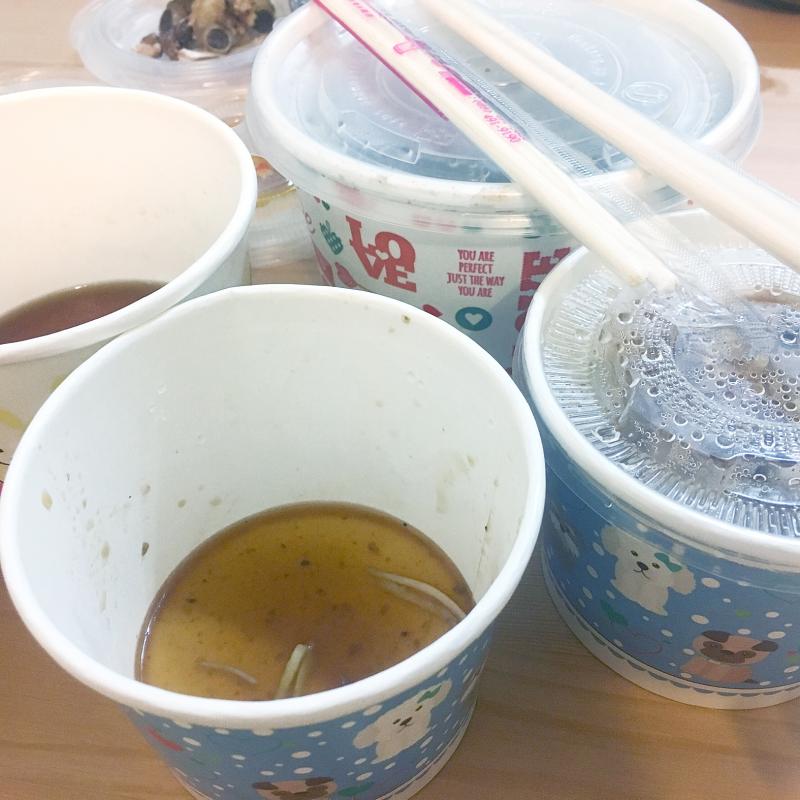
Photo: Yang Mian-chieh, Taipei Times
This is progress, for sure. Yet used bento boxes are often trucked a considerable distance — Tainan, for instance, is over 200km from the nearest recycling plant — and processing them requires significant amounts of electricity and water. Could there be a better solution than the one the EPA has devised?
Compostable tableware sounds like a good alternative. Several Taiwanese companies make cups, cutlery, plates, straws and other items that they claim are compostable.
You have to read the fine print, of course. Bamboo fiber sounds like an eco-friendly material, but typically the manufacturing process involves strong chemical solvents and acids.
PLA, a popular bioplastic that’s often described as biodegradable, is also problematic. In a Sept. 27, 2018 article, CommonWealth magazine pointed out that, “because PLA is hard to distinguish from other plastics, it can be easily mixed with other plastics for recycling, with bad consequences. The presence of PLA can plug up recycling machines, hurting productivity and, because of its biodegradable nature, the recycled plastic is virtually unusable and has to be dumped and incinerated like regular garbage.”
The accidental mixing of PLA and petroleum-based plastics continues to be a problem, according to a May report in the Liberty Times. What’s more, because only one recycling company in Taiwan has the ability to process PLA, a mere 6 percent of the 6,000-plus tonnes of PLA produced in the country last year was recycled.
As for claims that PLA is biodegradable, the newspaper pointed out that it only decomposes when the temperature stays between 58 and 70 degrees Celsius, with 90-percent humidity. In other words, it won’t break down in your home compost pile.
The only long-term solution is to drastically reduce the use of single-use products. The EPA seems to recognize this, but its efforts to educate the public haven’t had a big impact on behavior. Those who bring their own chopsticks and spoons when eating out are still a minority.
Perhaps it’s time to start making diners pay for disposable tableware — and not just the NT$1 or NT$2 per item that Taipei City Government now charges at hospitals, tourist attractions and sports venues under its control. Would a levy of NT$20 per disposable bento be enough to persuade you to use a Tupperware-type container, or maybe a retro tiffin box?
Steven Crook, the author or co-author of four books about Taiwan, has been following environmental issues since he arrived in the country in 1991. He drives a hybrid and carries his own chopsticks. The views expressed here are his own.

Last week saw the appearance of another odious screed full of lies from the People’s Republic of China (PRC) Ambassador to Australia, Xiao Qian (肖千), in the Financial Review, a major Australian paper. Xiao’s piece was presented without challenge or caveat. His “Seven truths on why Taiwan always will be China’s” presented a “greatest hits” of the litany of PRC falsehoods. This includes: Taiwan’s indigenous peoples were descended from the people of China 30,000 years ago; a “Chinese” imperial government administrated Taiwan in the 14th century; Koxinga, also known as Cheng Cheng-kung (鄭成功), “recovered” Taiwan for China; the Qing owned

In Taiwan’s politics the party chair is an extremely influential position. Typically this person is the presumed presidential candidate or serving president. In the last presidential election, two of the three candidates were also leaders of their party. Only one party chair race had been planned for this year, but with the Jan. 1 resignation by the currently indicted Ko Wen-je (柯文哲) of the Taiwan People’s Party (TPP) two parties are now in play. If a challenger to acting Chairman Huang Kuo-chang (黃國昌) appears we will examine that race in more depth. Currently their election is set for Feb. 15. EXTREMELY

Jan. 20 to Jan. 26 Taipei was in a jubilant, patriotic mood on the morning of Jan. 25, 1954. Flags hung outside shops and residences, people chanted anti-communist slogans and rousing music blared from loudspeakers. The occasion was the arrival of about 14,000 Chinese prisoners from the Korean War, who had elected to head to Taiwan instead of being repatriated to China. The majority landed in Keelung over three days and were paraded through the capital to great fanfare. Air Force planes dropped colorful flyers, one of which read, “You’re back, you’re finally back. You finally overcame the evil communist bandits and

They increasingly own everything from access to space to how we get news on Earth and now outgoing President Joe Biden warns America’s new breed of Donald Trump-allied oligarchs could gobble up US democracy itself. Biden used his farewell speech to the nation to deliver a shockingly dark message: that a nation which has always revered its entrepreneurs may now be at their mercy. “An oligarchy is taking shape in America of extreme wealth, power and influence that literally threatens our entire democracy, our basic rights and freedoms,” Biden said. He named no names, but his targets were clear: men like Elon Musk